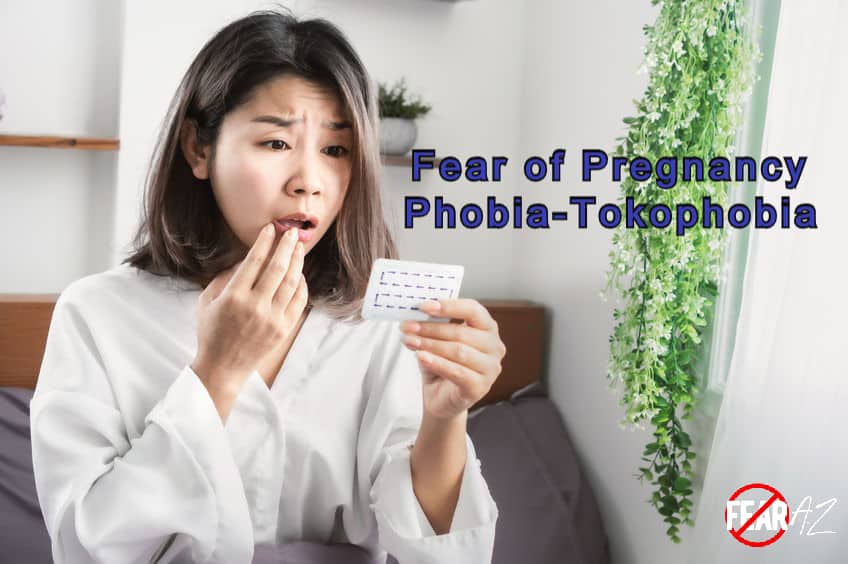Share This Article
Fear of Pregnancy Phobia, or Tokophobia
Do you wake up in the middle of the night after a romantic or intimate encounter filled with fear that you’ll get pregnant?
Are you terrified by the thought of childbirth? Do you like kids but dread the idea of carrying a baby in your womb for nine months? Is it the pain, fear of complications or that you will not do all that is needed to deliver a healthy baby?
Yes! But wait. Is it normal to be afraid of pregnancy?
While most first-time mothers are concerned about birthing pains, complications ect, but if your fear has reached unreasonable levels it may be time to look into if you suffer from tokophobia. You may feel ashamed by this since society expects that women will want to have children.
You simply can’t imagine yourself pregnant, much less in labor. The mere idea of pregnancy can cause you to break into a cold sweat or cause unmanageable fear.
The indications may point towards tokophobia. But don’t worry. The first step to overcoming this irrational fear of pregnancy is to understand where it comes from.

What Is Tokophobia?
The fear of pregnancy is known as tokophobia. It is derived from the Greek term tokos, meaning “childbirth,” and phobos, which means “an intense fear of an object or a situation.” Other names by which tokophobia is known are tocophobia, enfantaphobia, maieusiophobia, and parturiphobia.
It’s unclear how common tokophobia is. While some studies state that nearly 7 percent of women worldwide suffer from this phobia, other studies indicate that as many as 25 percent of women suffer from intense terror surrounding childbirth.
This fear could keep women from having biological children. Some with tokophobia might even break into tears if they come near a pregnant woman or hear the word “pregnancy.” These are extremes but quite possible.
What Causes Tokophobia?
Tokophobia is classified into two categories. Read on to learn which category your fear might fall under.
Primary Tokophobia
Primary tokophobia usually manifests in women who have never given birth. This condition often starts during adolescence. However, it may also begin in women during pregnancy.
Women who have a history of sexual abuse or trauma, miscarriage, abortion, termination of pregnancy, or complications related to childbirth are at a higher risk of developing primary tokophobia. For such women, undergoing medical tests during the process of childbirth or pregnancy may provoke unpleasant memories.
Secondary Tokophobia
Secondary tokophobia develops in females who have already given birth, especially if the process was traumatic. These include those who have miscarried, gone through an abortion, or experienced a stillbirth. Unsuccessful fertility treatments can also trigger this phobia. Secondary tokophobia can also manifest in women who have had normal or healthy pregnancies.
Other Causes of Tokophobia
There are many factors that can trigger tokophobia. Often times a combination of events contribute to the development of the fear. Here are more possible causes not mentioned above:
- Fear for the life of the unborn child
- Lack of trust in the healthcare system or doctors
- Fear of pregnancy-related issues and complications
- Hormonal changes
- Fear of the unknown
- Fear of undergoing extreme pain during childbirth
- Worry over the process of pregnancy and childbirth
- Hearing traumatic stories of pregnancy from friends and family
- A lack of social support
- Getting pregnant at a young age
Symptoms of Tokophobia
Women who are scared of being pregnant or those who have pregnancy anxiety are often perceived to be overreacting or melodramatic. As a result, those who suffer from tokophobia feel they cannot discuss their worries or symptoms with others, further causing isolation and depression.
Some women with tokophobia may choose to terminate their pregnancy because of their uncontrollable terror of giving birth.
Are you or someone you know scared of giving birth? Let’s take a closer look at tokophobia symptoms.
Mental/Emotional Symptoms
- Panic attacks
- Heightened anxiety
- Nightmares related to pregnancy and childbirth
- Experiencing thoughts of death
Physical Symptoms
- Fast breathing
- Increase in heart rate
- Excessive sweating
- Shivering or trembling in fear
- Crying
- Feeling hysterical
- Vomiting
- Nausea at the thought of something growing inside one’s body
Not all those who have tokophobia experience all the symptoms listed here. While some women may only experience mild symptoms, others may show more intense signs of their fear. Some women don’t realize they have this phobia until they become pregnant.
If you’re wondering if you might have tokophobia, consult a medical professional.
Self-Help Techniques for Tokophobia
If your symptoms are mild, you may be able to overcome your fear of getting pregnant with a little self-care. Here are some of the steps you can take to help you manage your tokophobia.
Share Your Worries
Discuss your anxieties with friends and family members who you believe can understand your fears. Knowing there are others who support you can reduce your anxiety surrounding pregnancy and childbirth.
Avoid Scary Pregnancy Stories
Sure you need to be aware of what happens during pregnancy and childbirth. However, you can get that information without having to deal with the emotional load of pregnancy horror stories.
Are you a first-time mother? As much as possible, skip the unpleasant stories regarding childbirth. If people continue sharing their negative experiences, ask them to stop. You don’t have to listen to these stories if they make you feel uncomfortable.
Take Prenatal Classes
If you want to become pregnant in the future but are being held back by your tokophobia, try joining a prenatal class. Here, you’ll learn all that happens during pregnancy. These classes teach about the changes the body undergoes and how you can manage pain better during labor.
Better yet, attend this class with your spouse or close friend. This way, they can give you support and advice that’s based on facts, not just hearsay. Some participants discover a ready-made community of fellow mothers during these prenatal classes. These friendships can last even after the classes have ended and everyone has given birth.
Getting Professional Help for Tokophobia
If the self-help techniques aren’t working, seek professional help. This can be in the form of one-on-one support provided by midwives, psychologists, counselors, or obstetricians. A mental health specialist might be in a better position to help you overcome your fear, especially if it starts to interfere with daily activities. They can help you discover how your fear developed in the first place.
One of the most common interventions is cognitive behavioral therapy (CBT). Under CBT, your therapist works with you to desensitize you to your phobia. You’ll learn new ways of coping with your fear. This technique is also used to help people overcome extreme anxiety and depression.
How to Avoid Tokophobia Altogether
It might not be possible to avoid tokophobia altogether. The best that you can do is change the subject when someone starts talking about pregnancy. You may even choose to stay away from those who are planning to become pregnant or are currently pregnant.
However, you might miss out on having a family of your own because of this obsessive fear of pregnancy. If you’re in a relationship, it’s important to discuss your fear of giving birth with your spouse or romantic partner.
If you want to become pregnant in the future but are being held back by tokophobia, seek professional help immediately. It’s time to get input on how to manage your fears surrounding childbirth.
Conclusion
Like other phobias, tokophobia is not forever. With the right help and treatment, you can overcome your fear and go on to lead a normal, healthy life. Eventually, you’ll even find yourself happily anticipating the pitter-patter of tiny feet into your heart and into your home.




